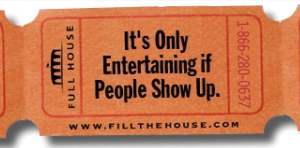You’ve Got to Understand Database Marketing in Today’s Sport Climate
This post was authored by Brandon Steffek, a 2009 Ohio University Sport Management graduate. Since graduation, he has been working for Full House Entertainment Database Marketing as Sales and Marketing Consultant.
Full House Entertainment Database Marketing provides targeted sales leads for direct marketing campaigns (direct mail, telemarketing, email). Over 600 sports teams and entertainment organizations have used Full House to find new business and residential customers. Full House works exclusively with sports and entertainment organizations to target businesses and consumers most likely to buy season tickets, group tickets and premium seating (suites, club seating, VIP clubs).
The following is intended to provide a brief overview of how teams use database marketing to improve their organization and generate new revenue. Whether it is professional or college sports; the principles are the same.
Database marketing from my experience can be defined as identifying new customers who possess similar characteristics of sport teams’ existing customers. Whether it’s a particular business industry, or demographic profile of a residential consumer, database marketing can be used to build custom databases of potential new prospects that can be reached through direct marketing campaigns. Database marketing can also be used to collect and market to existing customers.
The following 5 key points are meant to give insight from the perspective of a sports property/team as to how they can use ALL database marketing practices to renew, up sell, identify, analyze, and target new customers who are most likely to purchase tickets.
1. Renewals
a. DO NOT be satisfied working renewals. There are many more prospects out there that are very similar to your current customers.
b. Be aware of customer attrition; You should to expect to lose customers, so it’s your job to be proactive in finding new ticket buyers
2. Up Sell Current Customers
a. Upgrade single-game ticket buyers into a partial plan
- single-game ticket buyers have experience with your product
b. Persuade Partial Plan Holders into purchasing larger game packages
c. Improve Partial Plan Holders into Season Ticket Holders
3. Name Capturing Tools
a. Business card drop boxes
b. Surveys: Chance to win contests
c. Text messaging data collection
- Cell phone numbers can help to identify name, full mailing address, and demographics for previously anonymous fans
4. Analyze Current Customers: “Fish Where the Fish Are”
a. Purchase a custom database designed to target Businesses/Consumers/Groups that are similar to your existing customers
b. Use direct mail and/or Business email campaigns to drive inbound sales and inquiries
c. Use telemarketing to follow up with direct mail/email campaigns
5. Group Sales are KEY to putting more butts in your seats!
a. Big Business with 10+, 20+, 50+ employees, Company Anniversaries, etc.
b. Youth Organizations, Churches, Schools, Labor Unions, Health Clubs, Kids Birthday Parties, Adult Milestone Birthdays, etc.
As you can see, database marketing used well is a powerful tool for sport teams/organizations. Too often, students entering the sports industry are not familiar with how valuable database marketing can be for their sport organization. Individuals that understand how it works and can make it work will find themselves in demand by sports employers.
-Brandon Steffek
Sales and Marketing Consultant
bsteffek@fillthehouse.com

Read for class